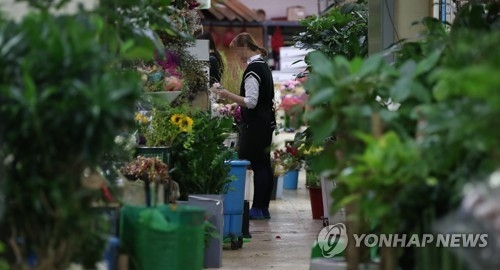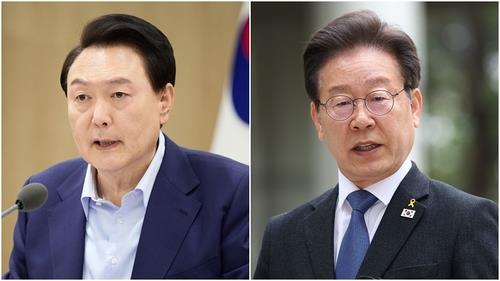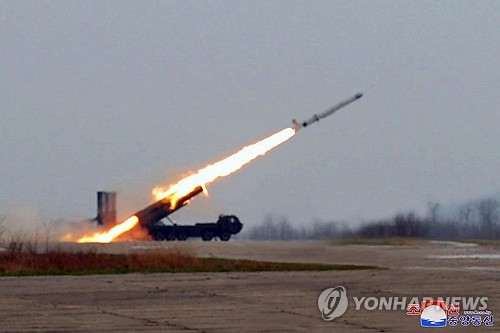(News Focus) South Korea moves away from corruption-prone culture
By Song Sang-ho and Kim Seung-yeon
SEOUL, Sept. 24 (Yonhap) -- A year after the landmark anti-graft law took effect, South Koreans are on track toward a more transparent society in a break from unfair, often corrupt practices deeply rooted in their social and political fabrics.
Sign of changes abound. Expensive gifts as a token of gratitude are now unwelcome. Splitting the bill for lunch is commonplace. Deliveries of flower bouquets and wreaths for weddings and funerals are shunned and excessive condolence money is turned down.
All these came after the Improper Solicitation and Graft Act went into force on Sept. 28, 2016, following an intense public debate on its merits and demerits, including possible negative ramifications on local businesses.
The law bans public servants, educators and journalists from receiving free meals valued over 30,000 won (US$26.39), gifts worth more than 50,000 won or congratulatory or condolence money of more than 100,000 won. Offenders will face a maximum sentence of three years in jail and a fine of up to 30 million won.
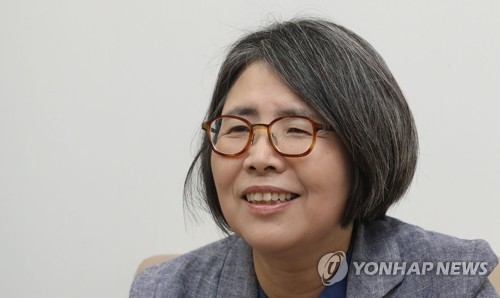
This photo, taken on Sept. 20, 2017, shows Kim Young-ran, the former chief of the Anti-Corruption and Civil Rights Commission speaking in an interview in Seoul. (Yonhap)
"There are some deep-seated practices in our culture that we had taken for granted although they could give rise to serious corruption," Kim Seok-ho, sociology professor at Seoul National University, told Yonhap News Agency.
"The law now serves as an institutional framework to prevent such practices and in actuality it has become a guiding principle for citizens' social and business activities. In this regard, the law has influenced our day-to-day lives very deeply," he added.
Soon after the law took effect, complaints surged as the fine line between corruption and gift exchanges -- or acts of hospitality -- brought confusion and uneasiness, and sent some local businesses into a tailspin.
Some decried the law for "meddling in" domains that should be regulated by each individual's moral choices. Others voiced concerns it could erode the traditional culture that values displays of affection through gifts, meals and other treatment.
But resistance appears to have gradually eased as many citizens, including Won Kyu-wang, a high-school teacher, have benefited from the law.
"Things have changed a lot. Most importantly, the relationships with my students' parents have become clean and transparent, as I do not need to wrestle with the issue of whether to receive gifts from the parents who want to express their gratitude," he said.
"Plus, I feel the relationship with other fellow teachers has also become more horizontal, comfortable and transparent," he said.
But sometimes, he feels "awkward" when he has to tersely reject chocolates, cookies or cans of coffee that his students bring him to show their "pure" appreciation after finishing their college entrance exams.
"My students often lie to me, saying they made the cookies and spent little money making them," Won said wryly.
In her speech released this week for a forthcoming forum, Kim Young-ran, the architect of the law and former anti-corruption agency chief, described the law as one that "trains people to say no to what is wrong."
"The feeling that I have as I have watched the changes in our society is that it aims to have people think about what they are used to," she said. "It expects people to think about whether what we are used to could be seen as unfair to others."
Kim also stressed that the law received public support because South Korea was "on the cusp of the change" people longed for when it was enacted.
Public support for it appears to be robust as a survey found nearly nine out of 10 citizens viewed it as "effective" albeit to varying degrees.
Im Dong-kyun, an urban sociology professor at the University of Seoul, conducted two surveys -- one involving 1,566 citizens in November and the other 1,202 citizens in August. In the second survey, 89.5 percent said they think the law was effective. Those who said the law had no effect comprised only 0.6 percent.
In the same survey, 52.9 percent said the amount of requests for job-related favors has declined, while 55.4 percent said that their exchanges of gifts have been reduced.
"There may be some who feel that the law has eroded our traditions and customs, but there seem to be more people in favor of the law," Im said.
Among those who have benefited from the law is Kim Min-joo, a PR agency worker. Thanks to the law, she is now less burdened by her meetings with clients or partners that mostly involve heavy drinking.
"I'd say the after-work client meetings are down about one-third," she said.
A journalist, who asked to be identified by only her last name Jeong, said she has more social get-togethers with her friends.
"I can catch up with them more often. (The law) has revived my 'inner-circles' and strengthened my personal relationships."
But not all are happy. It has negatively affected certain businesses and industries.
Floriculture industry is one example. Their revenues tumbled by double digits over three months into the implementation, according to recent industry data, as offering flowers or plants as gifts to a person related to duty are now practically banned.
Upscale restaurants -- some of which are decades old -- either closed down or revamped their signature dishes to lower the price to below 30,000 won per head.
"What else can we do? No one's going to come and eat here if (I) don't change. Survival comes first," an owner of a Hanwoo (Korean beef) restaurant said, declining to give his name.
In response to these complaints, ruling party lawmakers demanded a revision to the law. The Democratic Party has stressed the need to raise the price ceilings on gifts and meals to 100,000 won each.
A PR official from a major hotel chain, who also asked to remain anonymous, said the law has put a constraint on the scope and ways of marketing.
"Offering promotional gifts to media personnel was so customary that it was considered part of marketing strategies. We're working to build new ways but still it's like we've been deprived of an effective tool."
sshluck@yna.co.kr
elly@yna.co.kr
(END)
-
 Overdue debut of Korean abstract art pioneer Yoo Young-kuk at Venice Biennale
Overdue debut of Korean abstract art pioneer Yoo Young-kuk at Venice Biennale -
 Defense chief says N. Korea's hypersonic missile 'unsuccessful' in last-stage glide flight
Defense chief says N. Korea's hypersonic missile 'unsuccessful' in last-stage glide flight -
 Relax, immerse yourself in scents at Venice Biennale's Korean Pavilion
Relax, immerse yourself in scents at Venice Biennale's Korean Pavilion -
 N. Korea has capability to genetically engineer biological military products: U.S. report
N. Korea has capability to genetically engineer biological military products: U.S. report -
 S. Korea marks 30th anniv. of Korean Pavilion at Venice Biennale with contemporary art
S. Korea marks 30th anniv. of Korean Pavilion at Venice Biennale with contemporary art
-
 Overdue debut of Korean abstract art pioneer Yoo Young-kuk at Venice Biennale
Overdue debut of Korean abstract art pioneer Yoo Young-kuk at Venice Biennale -
 Relax, immerse yourself in scents at Venice Biennale's Korean Pavilion
Relax, immerse yourself in scents at Venice Biennale's Korean Pavilion -
 Artist Lee Bae captures ethereal Korean aesthetics at Venice Biennale
Artist Lee Bae captures ethereal Korean aesthetics at Venice Biennale -
 S. Korea marks 30th anniv. of Korean Pavilion at Venice Biennale with contemporary art
S. Korea marks 30th anniv. of Korean Pavilion at Venice Biennale with contemporary art -
 Defense chief says N. Korea's hypersonic missile 'unsuccessful' in last-stage glide flight
Defense chief says N. Korea's hypersonic missile 'unsuccessful' in last-stage glide flight
-
 (2nd LD) N. Korea says it conducted 'super-large warhead' test for strategic cruise missile
(2nd LD) N. Korea says it conducted 'super-large warhead' test for strategic cruise missile -
 N. Korea says it conducted 'super-large warhead' test for strategic cruise missile
N. Korea says it conducted 'super-large warhead' test for strategic cruise missile -
(URGENT) N. Korea conducted 'super-large warhead' test for strategic cruise missile: KCNA
-
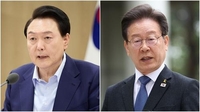 (LEAD) Yoon proposes first-ever meeting with opposition leader
(LEAD) Yoon proposes first-ever meeting with opposition leader -
 (LEAD) Gov't accepts university chiefs' request on med school enrollment quota: PM
(LEAD) Gov't accepts university chiefs' request on med school enrollment quota: PM
